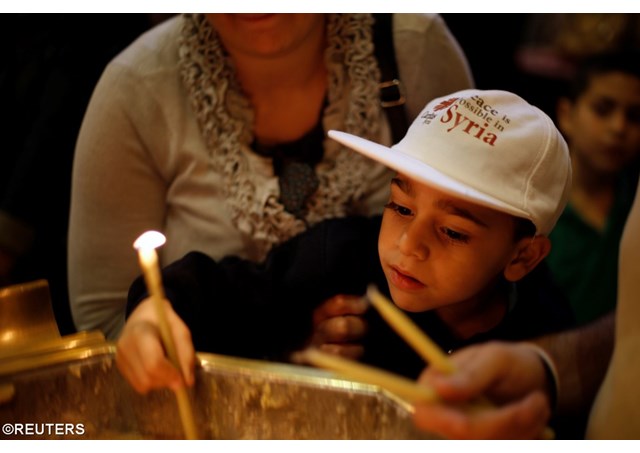
Pax Christi welcomes Pope Francis' message on non-violence

(Vatican Radio) The global Catholic peace network Pax Christi International has welcomed Pope Francis’ message for World Peace Day, calling on the Church to invest in non-violent ways of resolving wars and conflicts.
The message, entitled ‘Non-violence: A style of politics for peace’ was published in December to mark the Catholic Church’s observance of World Peace Day on January 1st.
In the message the Pope notes that violence leads to suffering through forced migrations, environmental destruction, terrorism and organized crime, as well as a deadly cycle of retaliation that ends up benefiting merely a few warlords.
Among those welcoming the Pope’s words is Marie Dennis, co-president of Pax Christi International and former director of the Maryknoll Office for Global Concerns. A mother of six, she has also served on the White House Task Force on Global Poverty and Development and writes regularly on peacebuilding from a Catholic perspective.
Marie spoke to Philippa Hitchen about the significance of this message and about a recent Rome conference on non-violence which Pax Christi jointly sponsored:
Marie Dennis says the global Pax Christi community is “just delighted” with the message that Pope Francis sent out for this New Year, noting that it is, significantly, the 50th annual World Peace Day message. She recalls the meeting, cosponsored by the Pontifical Justice and Peace Council and Pax Christi international last April, noting that participants made a proposal to the Vatican to make non-violence the theme for this January 1st message and praising Pope Francis for what she calls “a really extraordinary document on theme of non-violence”.
Reflecting Jesus' teaching
Marie says Pope Francis makes “very clear” that active non-violence is not mere passivity or withdrawing from engagement in a very violent world. Rather, she says, It is a way of life and a spirituality, but also “a powerful set of tools to help us respond” to threats of extreme violence and danger. She says the Pope takes an important step in the direction of non-violence as a message for the Catholic community worldwide, showing that our way of engaging the world has to reflect the life and teachings of Jesus.
Investing intellectual and financial resources
Marie says we live “in a challenging world” in which the suggestion of responding to violence with active, strategic non-violence is often written off as “utopian”. But, she insists, ”we believe, with Pope Francis, that addressing the deep roots of violence and the long-term needs of local communities” is more likely to produce a lasting and just peace. She says a glance at the consequences of past centuries of responding to violence with more violence, shows why it is important to redirect the “intellectual and financial resources, plus the creativity that the global family has spent developing the tools of war”, investing instead in developing the tools of active non-violence that could go a lot further in responding, even to very dangerous situations.
Long-term prevention strategies
Marie Dennis says response to the Pope’s message has been mixed, with a remarkable number of people in the Catholic community and beyond recognizing the significance of a move in this direction. At same time, she says, there’s a concern that “this is just too utopian an idea” for the real world and the challenge now is “to generate conversations about this within our own communities”, and to question how we might move to thinking in different ways about conflict resolution. What if the Church as an institution, she asks, began to engage with and advocate at a national and multilateral level on how to prevent the emergence of extremist groups? What if it focused on responding in more creative ways to long term conflicts in Syria, Iraq or Nigeria?
Coherent theological development
While many people fear a repudiation of the traditional Catholic framework of response, enshrined in the ‘just war’ theory, Marie insists that this message is “very consistent with where the Church has been moving theologically over the last century” as more and more situations have evidenced where active, strategic non-cooperation has been very effective in resolving conflicts. Our request as a conference last spring, she says, was to ask the Church to put the ‘just war’ theory aside for a while and to invest more energy and resources in “developing a new framework to help our world move beyond perpetual war and violence”.
| All the contents on this site are copyrighted ©. |


